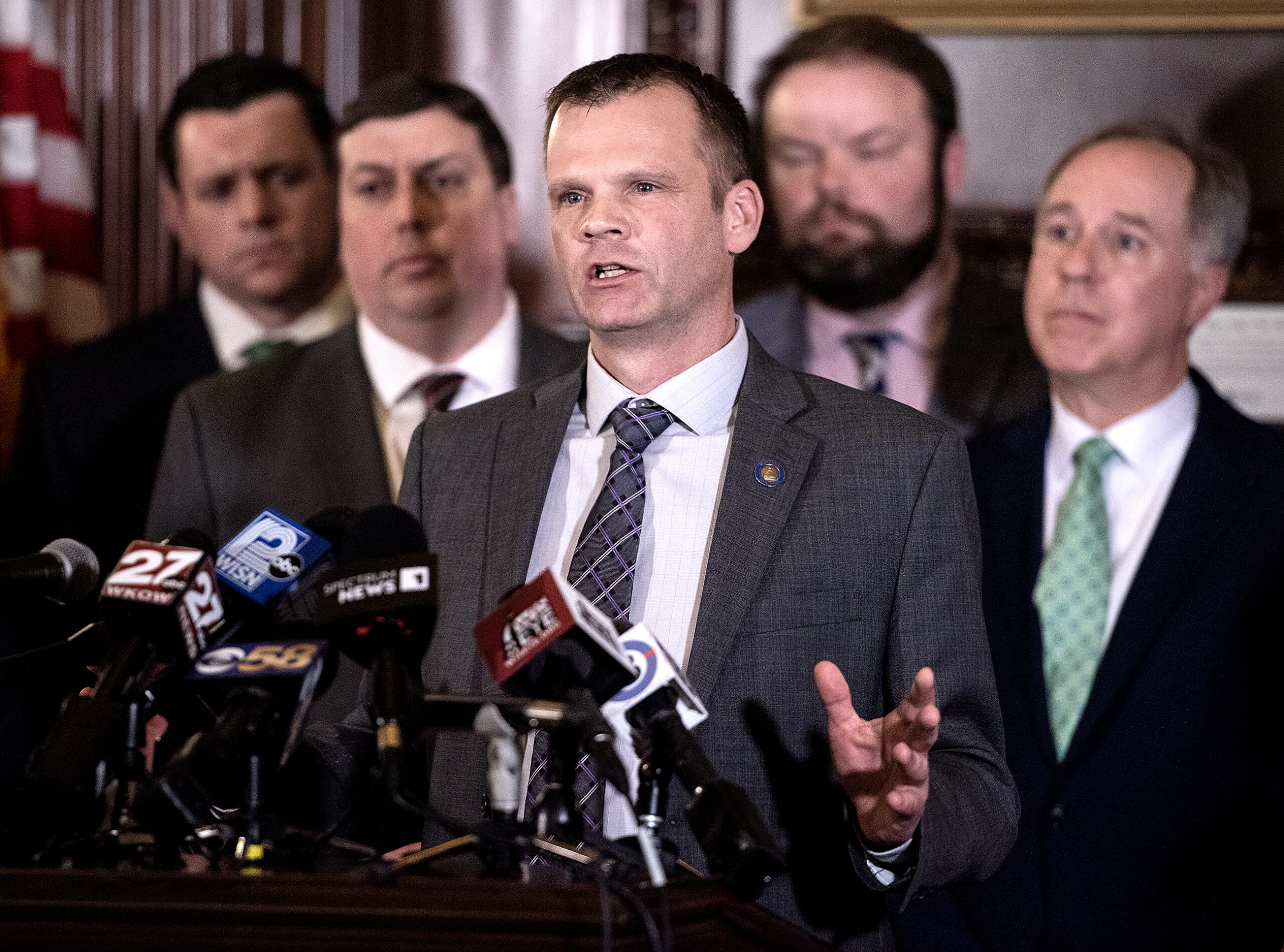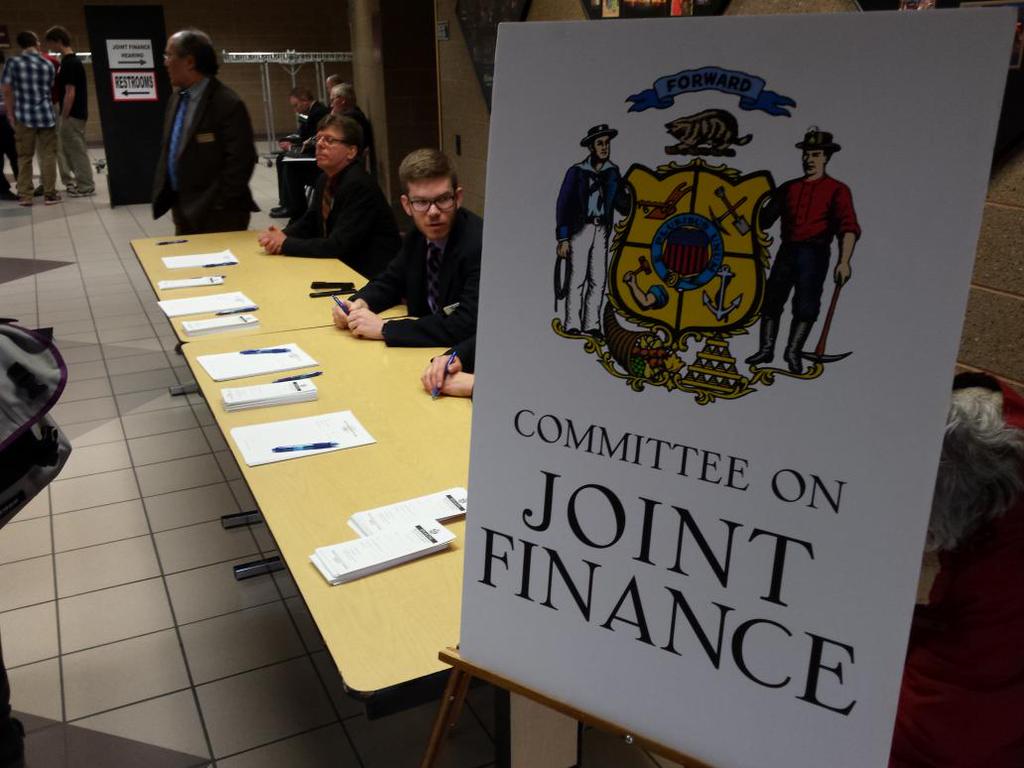A day after the state Assembly’s top Republican said his members were “done negotiating” a local government funding plan, the state Senate’s GOP leader announced his caucus would make a substantial change to the bill, one that would let Milwaukee and Milwaukee County raise local sales taxes without voter approval.
The comments from Senate Majority Leader Devin LeMahieu revealed a major rift between Republicans who run the Legislature on a pivotal issue. Assembly Speaker Robin Vos had previously called the referendum requirement one of Assembly Republicans’ “bottom lines,” and on Thursday, he said LeMahieu’s comments threatened to kill the bill.
The massive overhaul of the state’s system for funding local expenses like police, emergency medical services and roads includes a long list of items specific to Milwaukee, but perhaps none are as consequential to the city and county as the sales tax provisions.
Stay informed on the latest news
Sign up for WPR’s email newsletter.
Under the bill that passed the Assembly Wednesday night, the city of Milwaukee would be allowed to levy a local sales tax of 2 percent if voters approve it first in a referendum. Milwaukee County would be allowed to increase its local sales tax by 0.375 percent if approved by a separate referendum.
According to estimates by the state Department of Revenue, the city sales tax would increase local revenues by nearly $194 million per year while the county sales tax would generate nearly $73 million annually.
The revenue would be used to pay down pension debt and preserve police and firefighter staffing levels at a time when the city stands on at precipice of a “fiscal cliff.” Without the referendums, Milwaukee leaders have warned that hundreds of police and firefighters would be laid off and several libraries and fire stations would need to be closed just to balance the city’s books.
In comments first reported by The Associated Press, LeMahieu, a Republican from Oostburg who has been the Senate’s majority leader for the past two years, said the Senate would likely not include the referendum requirement in the local government funding bill it passes next month. LeMahieu said he had no idea why Vos had said Wednesday he was done negotiating.
“That’s unfortunate that he’s drawing a line in the sand now with this version of the bill and stopping negotiations on a bill that not everybody’s in agreement on,” LeMahieu told reporters.
LeMahieu’s comments echoed concerns raised earlier this month by Sen. Mary Felzkowski, R-Irma, the lead author of the local government funding plan in the Senate. The worry, she said, is that the city and county would be left without options if the referendums fail.
Vos, a Republican from Rochester who has been speaker since 2013, has consistently described the referendum requirement as a must-have for the Assembly GOP caucus. At an April press conference where he stood side by side with Milwaukee Mayor Cavalier Johnson and Milwaukee County Executive David Crowley to announce the local government funding plan, Vos said he was confident Johnson and Crowley could sell the tax plan to voters.
After Johnson warned at a public hearing on the plan that the referendums’ failure would lead to hundreds of layoffs, Vos again stood by his position, telling a forum in Milwaukee that he thought it should require a fairly cumbersome process to raise taxes.
On Wednesday, shortly before the Assembly debated and passed the local government bill, Vos told reporters gathered outside the state Capitol that the referendum requirement was staying in the plan.
“The people of the city and the county will have to pass it at a referendum,” Vos said. “That’s one of our bottom lines that we’ve had from the very beginning.”
Vos noted that the shared revenue plan Democratic Gov. Tony Evers introduced as part of his budget also included a requirement that Milwaukee County voters pass a referendum before raising the local sales tax.
Should the Senate remove the referendum requirement from the local government bill, it could send the amended plan back to the Assembly for an up or down vote on whether to “concur” with the changes. But in a written statement Thursday, Vos said Assembly Republicans would reject such a move.
“We will non-concur,” Vos said. “That could unfortunately kill the bill and all of our good work. Requiring voter approval for enacting a new tax, which was included in the original Evers proposal, should not be all that controversial.”
The dispute threatened to unravel a rare détente at the Capitol between GOP leaders and Evers. All three had called for a bipartisan approach to fixing the state’s shared revenue system, and as recently as Wednesday morning, Evers had spoken highly of LeMahieu and Vos.
But on Thursday, Evers’ office took a side in the GOP dispute, saying the governor was willing to allow the sales tax increases in Milwaukee without referendums.
“Gov. Evers agrees with Majority Leader LeMahieu — given Milwaukee’s urgent financial needs, a referendum is likely untenable,” Cudaback said. “Gov. Evers also appreciates Majority Leader LeMahieu’s willingness to keep working together and looks forward to continuing negotiations.”
There’s a chance that — despite LeMahieu’s blessing — the push to remove the referendum requirement will fail in the Senate. After LeMahieu’s comments were first published, Sen. Steve Nass, R-Whitewater, issued a written statement entitled “Republicans have Lost Their Minds on Milwaukee Bailout Bill.”
“It is time to stop the insanity and return to our core conservative fiscal values,” Nass said.
Republicans hold a 22-11 majority in the Senate, meaning they can afford to lose five Republican votes and still pass their agenda without help from Democrats. But the identical version of the bill must pass both houses of the Legislature and be signed by Evers before it can become law.
Wisconsin Public Radio, © Copyright 2025, Board of Regents of the University of Wisconsin System and Wisconsin Educational Communications Board.





